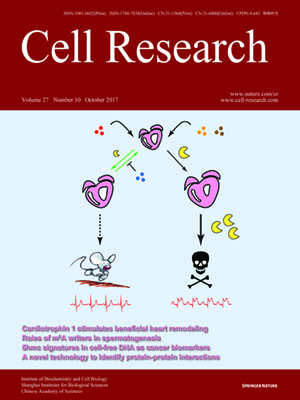
Volume 27, No 10, Oct 2017
ISSN: 1001-0602
EISSN: 1748-7838 2018
impact factor 17.848*
(Clarivate Analytics, 2019)
Volume 27 Issue 10, October 2017: 1231-1242 | Open Access
ORIGINAL ARTICLES
5-Hydroxymethylcytosine signatures in cell-free DNA provide information about tumor types and stages
Chun-Xiao Song1,13,*, Senlin Yin2,3,*, Li Ma4,5, Amanda Wheeler5, Yu Chen2, Yan Zhang6, Bin Liu6,7, Junjie Xiong8, Weihan Zhang9, Jiankun Hu9, Zongguang Zhou9, Biao Dong2, Zhiqi Tian10, Stefanie S Jeffrey5, Mei-Sze Chua4,5, Samuel So4,5, Weimin Li11, Yuquan Wei2, Jiajie Diao10, Dan Xie2,9,11 and Stephen R Quake1,12
1Departments of Bioengineering and Applied Physics, Stanford University, Stanford, CA 94305, USA
2State Key Laboratory of Biotherapy, West China Hospital, Sichuan University and National Collaborative Innovation Center, Chengdu, Sichuan 610041, China
3Department of Neurosurgery, West China Hospital, Sichuan University, Chengdu, Sichuan 610041, China
4Asian Liver Center, Stanford University School of Medicine, Stanford, CA 94305, USA
5Department of Surgery, Stanford University School of Medicine, Stanford, CA 94305, USA
6Department of Thoracic Oncology, West China Hospital, Sichuan University, Chengdu, Sichuan 610041, China
7Department of Pulmonary Tumor Ward, Sichuan Cancer Hospital, Chengdu, Sichuan 610041, China
8Department of Pancreatic Surgery, West China Hospital, Sichuan University, Chengdu, Sichuan 610041, China
9Department of Gastrointestinal Surgery, West China Hospital, Sichuan University, Chengdu, Sichuan 610041, China
10Department of Cancer Biology, University of Cincinnati College of Medicine, Cincinnati, OH 45267, USA
11Center of Precision Medicine, West China Hospital, Sichuan University, Chengdu, Sichuan 610041, China
12Chan Zuckerberg Biohub, San Francisco, CA 94518, USA
13Current address: Ludwig Institute for Cancer Research and Target Discovery Institute, Nuffield Department of Medicine, University of Oxford, Oxford OX3 7FZ, UK
Correspondence: Stephen R Quake, Tel: +1 650 736 7890 E-mail: quake@stanford.edu; Dan Xie,(danxie@scu.edu.cn)
5-Hydroxymethylcytosine (5hmC) is an important mammalian DNA epigenetic modification that has been linked to gene regulation and cancer pathogenesis. Here we explored the diagnostic potential of 5hmC in circulating cell-free DNA (cfDNA) using a sensitive chemical labeling-based low-input shotgun sequencing approach. We sequenced cell-free 5hmC from 49 patients of seven different cancer types and found distinct features that could be used to predict cancer types and stages with high accuracy. Specifically, we discovered that lung cancer leads to a progressive global loss of 5hmC in cfDNA, whereas hepatocellular carcinoma and pancreatic cancer lead to disease-specific changes in the cell-free hydroxymethylome. Our proof-of-principle results suggest that cell-free 5hmC signatures may potentially be used not only to identify cancer types but also to track tumor stage in some cancers.
10.1038/cr.2017.106
FULL TEXT | PDF
Browse 2008


